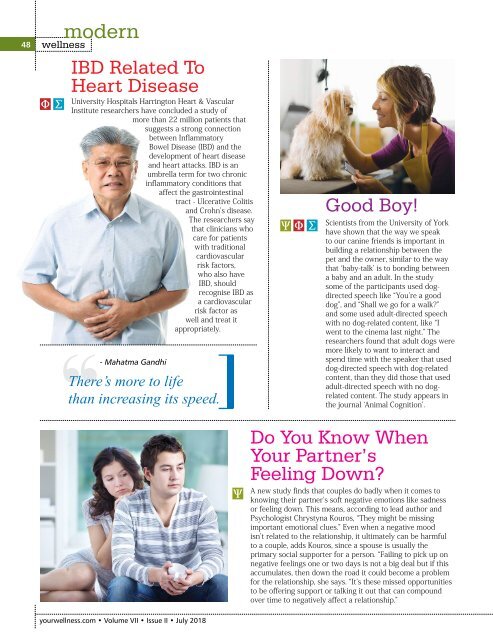New India_Assurance_ISSUE_July-2018
You also want an ePaper? Increase the reach of your titles
YUMPU automatically turns print PDFs into web optimized ePapers that Google loves.
modern<br />
48 wellness<br />
IBD Related To<br />
Heart Disease<br />
University Hospitals Harrington Heart & Vascular<br />
Institute researchers have concluded a study of<br />
more than 22 million patients that<br />
suggests a strong connection<br />
between Inflammatory<br />
Bowel Disease (IBD) and the<br />
development of heart disease<br />
and heart attacks. IBD is an<br />
umbrella term for two chronic<br />
inflammatory conditions that<br />
affect the gastrointestinal<br />
tract - Ulcerative Colitis<br />
and Crohn’s disease.<br />
The researchers say<br />
that clinicians who<br />
care for patients<br />
with traditional<br />
cardiovascular<br />
risk factors,<br />
who also have<br />
IBD, should<br />
recognise IBD as<br />
a cardiovascular<br />
risk factor as<br />
well and treat it<br />
appropriately.<br />
- Mahatma Gandhi<br />
There’s more to life<br />
than increasing its speed.<br />
Good Boy!<br />
Scientists from the University of York<br />
have shown that the way we speak<br />
to our canine friends is important in<br />
building a relationship between the<br />
pet and the owner, similar to the way<br />
that ‘baby-talk’ is to bonding between<br />
a baby and an adult. In the study<br />
some of the participants used dogdirected<br />
speech like “You’re a good<br />
dog”, and “Shall we go for a walk?”<br />
and some used adult-directed speech<br />
with no dog-related content, like “I<br />
went to the cinema last night.” The<br />
researchers found that adult dogs were<br />
more likely to want to interact and<br />
spend time with the speaker that used<br />
dog-directed speech with dog-related<br />
content, than they did those that used<br />
adult-directed speech with no dogrelated<br />
content. The study appears in<br />
the journal ‘Animal Cognition’.<br />
Do You Know When<br />
Your Partner’s<br />
Feeling Down?<br />
A new study finds that couples do badly when it comes to<br />
knowing their partner’s soft negative emotions like sadness<br />
or feeling down. This means, according to lead author and<br />
Psychologist Chrystyna Kouros, “They might be missing<br />
important emotional clues.” Even when a negative mood<br />
isn’t related to the relationship, it ultimately can be harmful<br />
to a couple, adds Kouros, since a spouse is usually the<br />
primary social supporter for a person. “Failing to pick up on<br />
negative feelings one or two days is not a big deal but if this<br />
accumulates, then down the road it could become a problem<br />
for the relationship, she says. “It’s these missed opportunities<br />
to be offering support or talking it out that can compound<br />
over time to negatively affect a relationship.”<br />
yourwellness.com • Volume VII • Issue II • <strong>July</strong> <strong>2018</strong>

















